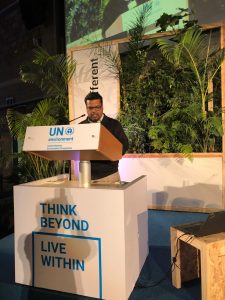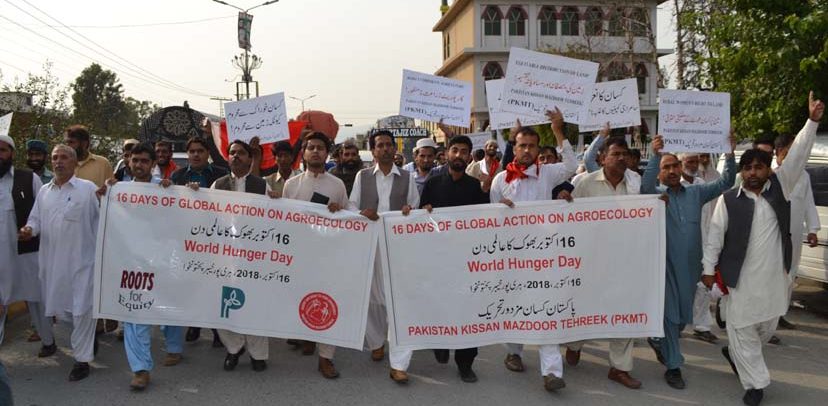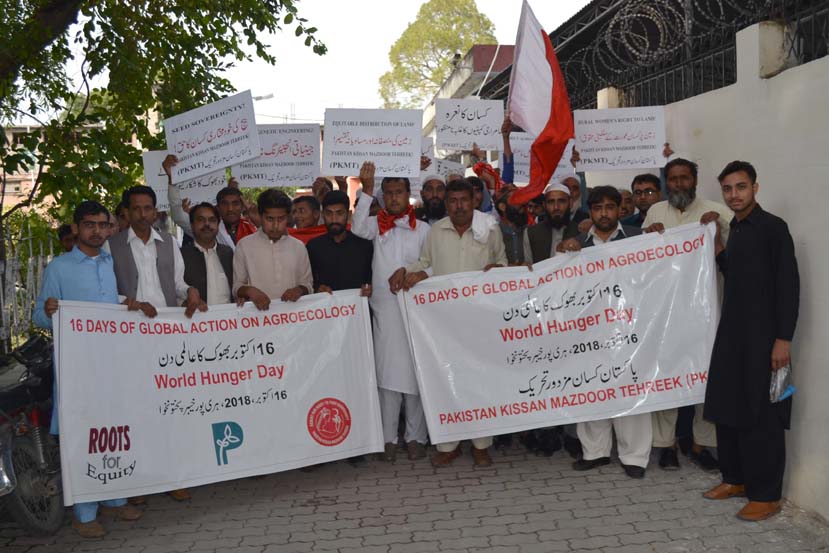Press Release
October 16, 2020
Roots for Equity and the Pakistan Kissan Mazdoor Tehreek (PKMT) in collaboration with People’s Coalition for Food Security (PCFS), Pesticide Action Network, Asia and Pacific (PAN AP) and Asian Peasant Coalition (APC) is marking the World Food Day as World Hunger Day on October 16, 2020. A webinar and protest has been organized in this regard in which small and landless peasants including PKMT members participated from different districts.
This event is part of a campaign, launched on the occasion of World Hunger Day, and titled “Rural People are Hungry for Food System Change”. It aims to promote a strategy for highlighting the toxic impacts of industrial chemical agriculture production systems and the acute need for food sovereignty and agro-ecology based food production systems. This year’s global campaign focuses on the plight of rural populations during the pandemic, and their demands for changes in the food and agricultural systems.
Tariq Mehmood, a member of PKMT, Khyber Pakhtunkhwa, spoke on the situation of hunger, poverty and unemployment during the Covid19 pandemic, He said that the transnational mega agro-chemical corporations’ domination in the food and agriculture system around the world, their exploitation and destruction of biodiversity and natural habitats is a catalyst for Corona pandemic.
According to a report by the United Nations FAO (The State of Food Security and Nutrition in the World), the epidemic could lead another 83 to 132 million people suffering from hunger by 2020, and if the current situation continues by 2030, 841.4 million people in the world will be hungry.
According to a member of PKMT Mohammad Zaman from Sahiwal, it is reported in the Pakistan Economic Survey 2019-20, the corona virus had a severe negative impact on the Pakistani economy and at least another 10 million people are feared to be pushed to living below the poverty line in Pakistan. The number could increase from 50 million presently to 60 million.
In the Global Hunger Index, Pakistan ranks 106th out of 119 countries where consumption of meat, poultry, fish, milk, vegetables and fruits is six to 10 times lower than that of developed countries. The worsening situation of hunger and poverty can be gauged from the statement of Sania Nishtar, Special Assistant to the Prime Minister for Poverty and Social Protection, that “almost half of the country’s population will be covered by the Ehsas Program.” The statement indicates that in Pakistan, where almost half of the population is employed in the agricultural sector, the current epidemic of rising hunger, poverty and unemployment has exacerbated the pervasive exploitation and brutality of this rotten food and agriculture system that is based extracting super-profits from the poorest segments of society.
Speaking on the global food and employment crisis, Wali Haider, of Roots for Equity said that rural populations around the world are already aware of these facts and now the food and employment crisis and growing hunger during the Corona virus pandemic has proved that the current system of food and agriculture, which is dominated by the big capitalist countries and their for profit companies, has failed.
This domination of the imperialist powers over the global food and agriculture system has linked the local rural economy, in third world countries like Pakistan, to the global agricultural market. This has resulted in the most important resources like our agricultural produce, our land and water have become a source of surplus profits for multinational corporations. A clear example of this is the increasing production of sugarcane and other cash crops for the production and export of agro-fuels like ethanol, while the production of the most important food crops such as wheat is declining.
This is one of the reasons for the rise in food prices and the consequent increase in hunger. There is an urgent need to change the system where farmers are forced to depend on seeds, chemicals and toxic inputs of companies. These chemicals also pollute the entire food and agricultural system and destruction of the ecosystems and biodiversity.
In contrast, a sustainable food production system, agro-ecology, provides farmers with a strategy that protects not only their rights but also of other small food producers. Farmers’ right to land under agro ecology guarantees the establishment of collective and individual seed banks and their exchange. It also protects and promotes safe and natural systems of food and agriculture production ensuring food security of the most marginalized and vulnerable communities as well as safe nutritious food and environment for all.
Speaking on the women farmers’ rights Azra Sayeed of Roots for Equity said that the livestock and dairy sector accounts for 56% of the total agricultural production and the majority of farmers involved in milk and meat production are small scale. It consists of cattle breeders, especially women, who make it possible to produce 60 billion liters of milk annually in the country, but these same rural populations are starving themselves as a result of the monopoly of capitalist companies in the food and agriculture sector.
In the name of achieving so called standardization of milk, meat and other foods, corporations are paving a clear path to monopolizing the dairy and meat sector. This will only lead to further exacerbation of hunger and malnutrition in the country. It is important to note that according to the National Nutrition Survey 2018, 53% of children and 44.3% of women in the country are suffering from anemia.
Raja Mujeeb, a member of PKMT Sindh, referring to the small and landless peasants are most affected by the Covid19 epidemic, said that food producers have been forced to depend on poor quality seeds where the companies have established a monopoly and at the same time land is in the hands of feudal lords and increasing encroachment of capitalist systems of production and marketing.
If the farmers have control over all the productive resources including land and seeds, then our farmers, laborers, fishermen and the rural population can get food even in the face of the current pandemic or any kind of emergency. That is why PKMT believes that food sovereignty and self-sufficiency in food and agriculture based an end to feudalism through just and equitable land distribution among farmers and imperialist food policies is critical for a peaceful democratic sovereign state!
Released by: Roots for Equity & Pakistan Kissan Mazdoor Tehreek (PKMT)




